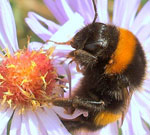£10 million for bee research
A new initiative will fund research into the decline of bees and other insect pollinators vital to the UK economy


The Government has announced a new £10-million research initiative to investigate the decline of bees and other insect pollinators, such as butterflies and moths.
Over the past two years, the number of bees in Britain has fallen by 15%. The decline has been blamed on climate change, in particular warmer winters and wetter summers, diseases such as colony collapse disorder and parasites such as the varroa mite.
Apart from the Government’s £2 million, the Pollinators Initiative funding comes from a number of major research bodies, including the Wellcome Trust, Scottish Government, the Natural Environment Research Council and Biological Sciences Research Council.
Hilary Benn, the environment secretary, said: ‘With one in three mouthfuls coming from insect-pollinated crops, we need to support bees and other pollinators.
‘This funding will give some of Britain’s world-class researchers the chance to identify the causes of the decline we’re seeing in bee numbers, and that will help us to take the right action to help.’
But Britain’s only Professor of Apiculture, Prof Francis Ratnieks, expressed concern that the research money would be ‘diluted’ on other pollinators, rather than solely going to help bees.
Prof Ratnieks said: ‘There are more than 2,000 species of moths and butterflies and 250 species of bee in Britain. If this becomes a project aimed at funding 2,000 species, I fear the honeybee—which is a single species and the most important pollinator—may get a little left out.’
Exquisite houses, the beauty of Nature, and how to get the most from your life, straight to your inbox.
Tim Lovett, president of the British Beekeepers' Association, said: ‘It is vital that these funds are committed to the work that can make a real difference and meet the challenges facing honeybees in this country.’
Honeybees play a vital role in putting food on our tables through the pollination of essential crops, and are worth an estimated £200 million a year to the UK economy.
To comment on this article, use the comment box below, or email us at clonews@ipcmedia.com. Read more about the countryside
Country Life is unlike any other magazine: the only glossy weekly on the newsstand and the only magazine that has been guest-edited by His Majesty The King not once, but twice. It is a celebration of modern rural life and all its diverse joys and pleasures — that was first published in Queen Victoria's Diamond Jubilee year. Our eclectic mixture of witty and informative content — from the most up-to-date property news and commentary and a coveted glimpse inside some of the UK's best houses and gardens, to gardening, the arts and interior design, written by experts in their field — still cannot be found in print or online, anywhere else.
